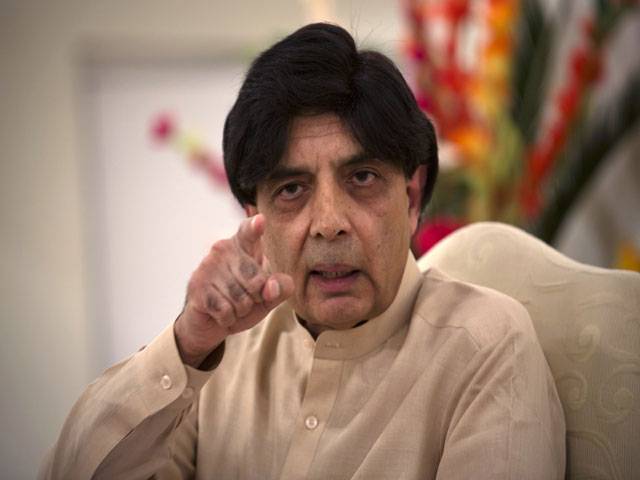ISLAMABAD - Interior Minister Chaudhry Nisar Ali Khan on Tuesday stunned the entire opposition in the Senate by stating that “banned sectarian organisations could not be equated with other banned terrorist organisations”.
The statement led to the boycott of the house by opposition benches.
The interior minister gave the remarks to justify his meeting with Ahmed Ludhianivi, the chief of banned sectarian organisation Ahle-e-Sunnat Wal Jamaat (ASWJ).
The minister was briefing the Senate on the disappearance of four rights activists. He, however, consumed most of the time of his speech to respond to the allegations of opposition benches over his performance rather than updating the house on the investigations on the abductions of the rights activists from Islamabad and Punjab.
“There are two types of banned organisations, one purely terrorist organisations and others proscribed organisations, sectarian in nature due to the Shia-Sunni conflict and you cannot equate banned sectarian organisations with the banned terrorist organisations,” the minister said, adding the Shia-Sunni conflict was as old as 1300 years.
Nisar while answering the allegations of the major opposition party — the Pakistan People’s Party (PPP) — said he also had photographs of meetings of representatives of these banned organisations in the presidency during the last PPP tenure.
Soon after the remarks, the entire opposition staged a walkout saying the minister was giving a strange definition of terrorism and sectarianism. PPP Senator Taj Haider alleged that the minister was promoting terrorism with this statement.
Muttahida Qaumi Movement Senator Tahir Hussain Mashhadi also challenged Nisar’s statement saying that the Shia-Sunni conflict was not hundred years old as both had been living as brothers.
Mashhadi while talking to The Nation said the interior minister had clearly made a distinction between terrorism and sectarianism and that was unfortunate. “The minister was trying to give the impression that the sectarianism phenomenon was not new,” he said, adding “Nisar was encouraging terrorism in this way”.
After Nisar’s briefing, Leader of the Opposition in Senate Aitzaz Ahsan said that the briefing contained nothing new on the abductions of the four human rights activists.
He said the PPP had only objected to the press conference of the interior minister he made soon after the release of Justice Qazi Faez Esa report on the Quetta incident. He said the minister was unnecessarily getting a credit for the decline in terrorism incidents in the country. “The credit for the decline in terrorism goes to the military leadership,” he said, adding the civilian leadership was unaware of the start of operation Zarb-e-Azb.
The interior minister challenged the stance of the Aitzaz and said that two former retired army generals — Raheel Sharif and Zaheerul Islam — could verify the meetings held at the Prime Minister’s Office before the start of the operation.
Earlier, the interior minister while briefing the house on the missing activists said that efforts were being made to trace them. He said that Salman Haider was abducted from Koral Chowk and the security agencies through the cameras of Safe City Project had noticed that a VIGO van was following Haider for a long time. Soon after the abduction, the vehicle was seen going towards the airport road Rawalpindi. The other three activists went missing from Punjab. The government is making utmost efforts to bring back all the persons safely. “This government has zero tolerance policy towards the phenomenon of missing persons as this was the trend of the past regimes,” he said.
Responding to the allegations of the PPP and other opposition parties over his performance, Nisar said that he had given briefings on four counts over the implementation of the National Action Plan but his opponents had been criticising him over his performance for no reasons. “A leader of the opposition party said, soon after one of my last briefings to the Senate, that if the federal government had complete prior information about the Karachi airport terrorist attack, then this was its failure to stop the incident,” he said adding that “this was all point-scoring”.
“This is a sacred house and the speeches made here and on roads should be different.” He explained that the federal government had no role in the operations of the provincial governments. He said that he was being victimised for no reasons. “The terrorist incident remained low in 2016,” he said adding that he had held 142 meetings on counter-terrorism and security during the last three years while the record of such meetings of the previous PPP regime was missing.
Ahsen rejected the minister’s explanation stating that no one was serious in hearing about the performance of the minister as he was asked to give a briefing on the missing activists to which he had failed to update the house.






